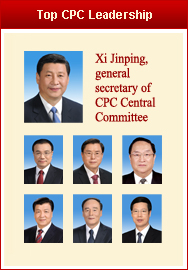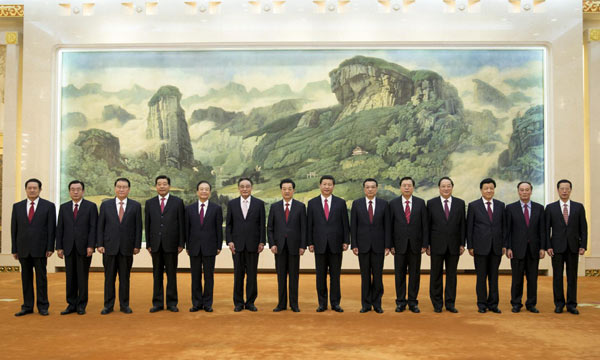China builds up new pillar industries
(Xinhua)
Updated: 2012-11-06 18:53
BEIJING - Chinese people born in the 1980s were taught that China's pillar industries are in the auto, construction, mechanical, electrical and petrochemical sectors, but the government is hoping that later generations learn something else.
The Chinese government is speeding up efforts to increase the proportion of emerging sectors in the country's economy. It expects that when the children of the post-80s generation start school in a few years, they can learn about four new pillar industries -- energy conservation and environmental protection, new-generation information technology, bio-tech industry and high-end equipment manufacturing.
Tech-intensive pillars
At a water recycling plant on the Wenyu River in northeast Beijing, sewage is forced through thin membranes dotted with holes about one five-hundredth the size of a human hair.
Every day, 200,000 tonnes of wastewater are processed by the micro-filtration system in this plant. The recycled water then runs into factories and fields in Beijing.
"The cost of recycling one tonne of water is 0.7 yuan," said Wen Jianping, president of Beijing Origin Water Technology Company, the developer of the micro-filtration system. (0.7 yuan is equal to about $0.1)
"We develop the membranes ourselves, rather than importing them. That is why the cost is low," said Wen, 50, who researched membrane technology since 2000.
"Sewage treatment has become popular in China. Factories want sewage!" said Wen, who also noted that Origin Water has built one of the world's largest membrane R&D and production bases.
According to him, many local governments in China, which are economical in water use, have an annual plan for water consumption, and they do not approve new projects once the quota has been reached. "So, many factories turn to sewage treatment."
Despite a slowing Chinese economy, Wen's company saw its revenue more than double to 466 million yuan ($73.85 million) in the first half of this year. The company's profit rose by one-third year on year to about 80 million yuan.
Wen said his company is planning to enter the European and US markets next year. "This sector is not affected much by the global economic turmoil. As long as people consume water, water needs to be treated."
Wen's plan, built on Origin Water's technological advantage, reflects changes in Chinese companies' "go global" strategy.
Hurt by weakening demand amid the lingering global crisis, Chinese companies are ramping up efforts to enhance the competitiveness of their products. All the new pillar industries for which the country is making plans are technology-intensive.
China, though not known for technological innovation, is building an environment that could nurture more innovation. The country does not want to run the risk of falling behind globally when some high-tech industries fully emerge, analysts have said.
The upcoming 18th National Congress of the Communist Party of China (CPC), slated to convene on November 8, is expected to produce more government policies to help the new pillar industries take shape.
In Wen's eyes, it is not easy to stay in the business and turn a profit in the tech-intensive emerging sector.
"We have built a research and development team of 300 persons within the company of 1,200 employees," said Wen. "It is important to constantly make technological innovations so our membranes can remain among the world's best."
Experienced engineers
Voice Touch, an app developed by Chinese engineers, recently became a competitor for Apple's Siri voice input system.
The new app, which allows Chinese people to speak instead of type when sending messages, calling friends and generating microblog posts, has been refused entry into the Apple Store several times since June. The latest explanation from Apple is that Voice Touch is "too similar with Siri," according to the app's developer, Anhui USTC iFlytek Co. Ltd.
The refusal was interpreted as "Voice Touch beats Siri" by some Chinese fans who think Voice Touch is "smarter." Voice Touch has been downloaded on "jail-broken" iPhones over one million times, and Android downloads have hit four million, according to the developer.
Jiang Tao, vice president of iFlytek, said Voice Touch is more accurate in voice recognition for two reasons. "For one thing, we have a better algorithm for computing the results. Chinese engineers are best in the world," he said.
"For another, iFlytek has been working in speech technology fields for more than a decade. We have collected large volumes of voice data in Chinese, including dialects," he said.
China, a country known for its large talent pool of engineers, is trying to keep pace with global developments in the new-generation IT sector that features cloud computing, mobile Internet and the Internet of Things, among others.
Observers maintain that Chinese engineers, diligent and smart, can play an important role in China's drive to build up new pillar industries.
But Jiang admitted that amidst global competition, Chinese companies lack innovative ideas. "We can beat foreign companies in technology, but at a higher level of competition, it is the idea," said Jiang.
"Mark Zuckerberg invented a new business model. China's Ma Yun invented a new model," said Jiang, comparing the founder of Facebook with the chairman of China's leading e-commerce company Alibaba. "We are eager to become a great company, but we have not yet invented a new model."
Government-led innovation
Besides the four pillar industries, China is building three pioneering industries -- new energy, new-type materials and new-energy vehicles, which are expected to play a significant role in the country's development orientation.
According to China's plan, the added value of the aforementioned seven strategic emerging sectors will account for 8 percent of the country's GDP in 2015 and 15 percent in 2020.
Feng Xue, 34, a driver of the No 90 bus in Beijing, is probably one of the most experienced electric vehicle (EV) drivers in China.
"It is nice to drive a bus without a tailpipe," said Feng, who has recorded nearly 80,000 kilometers in the all-electric bus since he was chosen to drive the electric shuttle bus for the Beijing Olympic Games in 2008.
"Driving an EV is quite similar to driving a conventional bus, except that it has meters showing the battery level and battery temperature instead of the gas level," said Feng.
When Feng started out four years ago, there were few electric vehicles in China. Now about 19,000 electric vehicles are running on China's roads, mostly buses, taxis or vehicles for public services, like mail delivery or garbage collection, according to the Ministry of Science and Technology.
China, a late-comer to the global auto industry, is gearing up to take the lead in meeting the industry's "go electric" trend. It has invested heavily to develop EVs and to subsidize them through trial projects, such as those for buses.
There are two types of electric vehicles -- hybrid-electric vehicles powered by both batteries and gasoline and all-electric vehicles propelled by only electric power.
After exploring this field for more than a decade, China has decided to focus on the development of all-electric vehicles. The country is currently focusing on lithium battery research in hopes of increasing the range of EVs and leading the market.
The all-electric No 90 bus runs a 33-km route. Feng Xue said he can do two trips before changing batteries at the terminal station. The electricity costs about one-sixth of what it would cost to burn oil.
Feng said the range anxiety about the electric bus will be "temporary."
"Just a decade ago, the cell phone battery was big and unstable. Now it does not bother us anymore. Technological breakthroughs may happen at any minute," he said.
Related Stories
China supports bamboo, rattan industry 2012-11-06 17:28
China Mobile plans industrial park for Beidou system 2012-11-06 16:52
China's industrial profits set to recover 2012-11-06 16:49
Metal mining industry faces reshuffle 2012-11-06 15:45
Fuzhou invests 10b yuan in Blue Economic Industrial Park 2012-11-06 13:51
City opens cultural sector to woo investors 2012-11-06 10:39
Optimistic outlooks give cheer to services sector 2012-11-06 10:13
Old industrial area gets modern makeover 2012-11-06 08:18
Metal show gathers world's best in industry 2012-11-06 08:15

Top News
Xi emphasizes adherence to CPC Congress spirit
Top legislator urges implementation of congress spirit
Moderately prosperous China brings chances to world
Video







